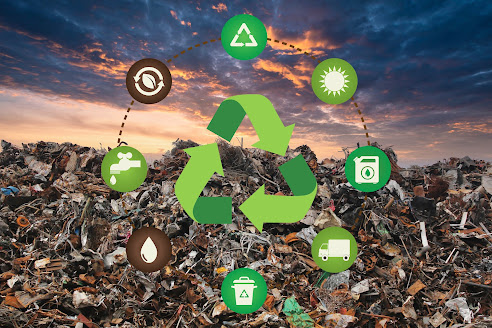Waste management has become an increasingly critical issue in
our modern world, as the planet faces the challenges of overconsumption and
environmental degradation. The staggering amount of waste generated daily has
led to overflowing landfills, pollution, and the depletion of natural
resources. However, by adopting sustainable waste management practices,
individuals can play a vital role in reducing waste and minimizing their
ecological footprint. Here's a comprehensive guide on how to effectively manage
and reduce waste in your bin through sustainable practices.
1. Embrace the 3 R's: Reduce, Reuse, Recycle
The foundation of sustainable
waste management lies in the three R's: Reduce, Reuse, and Recycle.
Ø Reduce: The best way to minimize
waste is by consuming less in the first place. Avoid single-use items, buy
products with minimal packaging, and opt for items that are built to last. By
making conscious choices, you can significantly reduce the amount of waste that
ends up in your bin.
Ø Reuse: Get creative with repurposing
items that might otherwise be discarded. Glass jars can become storage
containers, old clothes can be transformed into rags, and cardboard boxes can
serve as storage organizers. By reusing items, you extend their lifespan and
reduce the demand for new resources.
Ø Recycle: Recycling is essential, but it's vital to understand the recycling guidelines in your area. Different materials require specific recycling processes. Proper sorting and cleaning of recyclables before disposal are crucial to ensure that they can be effectively processed.
2. Composting: Turn Waste into Nutrient-Rich Soil
Organic waste, such as food scraps and yard trimmings,
constitutes a significant portion of household waste. Instead of sending this
waste to landfills, where it decomposes and releases harmful greenhouse gases,
consider composting. Composting not only reduces waste but also creates
nutrient-rich soil that can enrich your garden. Many cities offer composting
programs, but you can also compost at home using a compost bin or pile.
3. Adopt Minimalism and Mindful Consumption
Living a minimalist lifestyle focuses on owning fewer
possessions and simplifying one's life. By adopting this approach, you not only
reduce clutter but also minimize the amount of waste generated. Prioritize
quality over quantity when making purchases, and opt for items that have a long
lifespan. Additionally, practicing mindful consumption encourages thoughtful
purchasing decisions, reducing impulse buys and wasteful spending.
4. Participate in Community Initiatives
Communities often organize waste management and
cleanup initiatives. Join local clean-up events, recycling drives, or
neighborhood composting programs. Engaging with your community not only fosters
a sense of belonging but also amplifies the collective impact of sustainable
waste management efforts.
5. Educate Yourself and Others
Knowledge is a powerful tool for change. Stay informed about
waste reduction strategies, new recycling methods, and the environmental impact
of different materials. Share this information with your friends, family, and
community to inspire broader adoption of sustainable practices.
6. Opt for Eco-Friendly Packaging
When shopping, choose products with eco-friendly packaging.
Look for items with minimal or biodegradable packaging. Avoid excessive plastic
and opt for materials that are easier to recycle or compost.
7. Invest in Reusable Products
Single-use items contribute significantly to waste accumulation. Invest in reusable alternatives to reduce waste. This includes reusable shopping bags, water bottles, coffee cups, and food containers. These small changes can make a big difference over time.
8. Properly Dispose of Hazardous Waste
Certain types of waste, such as batteries, electronics, and
hazardous chemicals, require special handling. Many communities have designated
drop-off points or collection events for these items to ensure they are
disposed of safely and responsibly.
9. Support Sustainable Brands
Support companies that prioritize sustainability in their
products and practices. Look for certifications like Fair Trade, organic, or
carbon-neutral labels. By choosing to support eco-conscious brands, you
encourage responsible product removal
and consumption.
10. Continuous Evaluation and Improvement
Sustainable waste management is an ongoing process. Regularly
evaluate your waste generation patterns and identify areas for improvement.
Keep refining your waste reduction strategies and celebrate the progress you
make.
Conclusion
In conclusion, reducing waste in your bin through sustainable
waste management practices is a meaningful way to contribute to a healthier
planet. By embracing the 3 R's, composting, adopting a minimalist mindset,
participating in community initiatives, educating others, and making conscious
choices, you can significantly minimize the waste that ends up in landfills and
positively impact the environment for generations to come.

Comments
Post a Comment